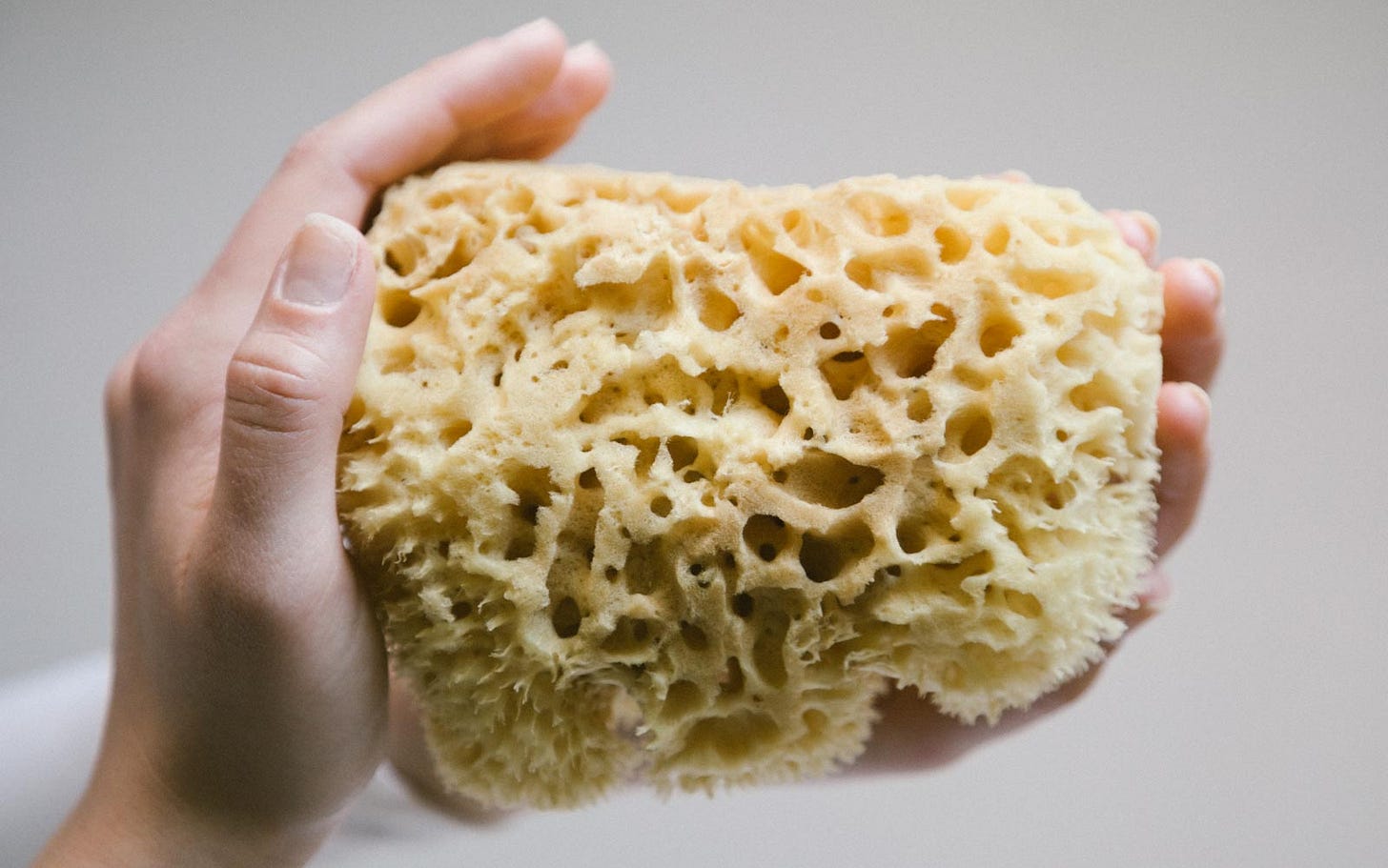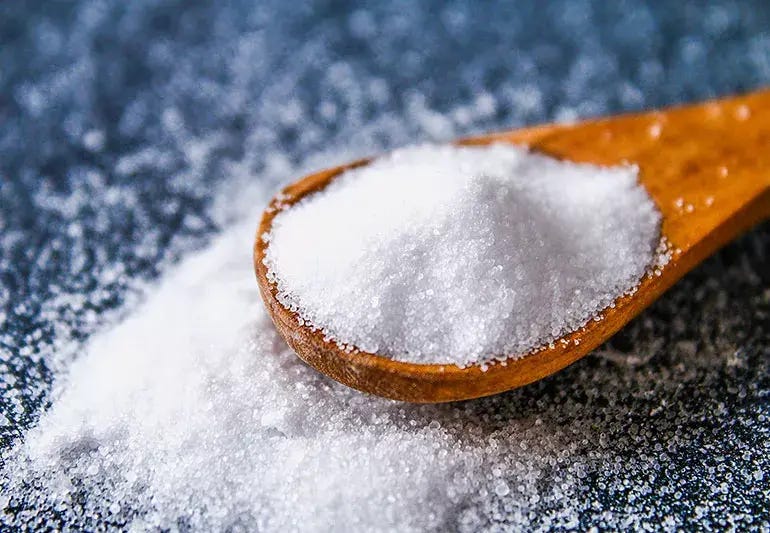The sponge myth.
Feeling drained after certain interactions? You may be a sponge. You don't have to be.
Arguably one of the most common well intended erroneous myths (or: mythtakes ™️) is one I call “The sponge myth”.
TL,DR: A healthy empath ain’t a sponge.
What’s a sponge?
A sponge 🧽 is a well intended human, often (but not always) self identifying as an “empath”, going around absorbing other people’s “stuff”, much to their own disservice. Sounds familiar? ¯\_(ツ)_/¯
The good news: We can hold space without holding others.
How is a sponge born?
A few of the (not mutually exclusive) ways:
- “People love me when I absorb their spills”. One may have learned that they receive praise/ love when they act as a sponge. A loved one may spill their stuff for a sponge to absorb and go “Thank you, I feel so much better” while the sponge is left feeling drained. (This pattern at times traces back to a chaotic household or a time when one had to become a peacemaker of sorts)
- “Let me help you with this mess”. One may (feel like they) have the capacity to hold other people’s heaviness and taking those feelings on is their unconscious / subconscious attempt at “helping” others and feeling valuable.
- A martyr/ savior: In a more extreme setting, taking on other people’s feelings may be an expression of the martyr/ savior archetype. While the notion of drama triangle (victim-villain-savior) deserves of its own post, it suffices to say we live in a society loves a savior- be it superman, wonder-woman or the messiah themselves. Saviors may think: “Well this person won’t go to therapy but they talk to me, it is my job to make them feel better, even if it leaves me feeling worse every time”. Spoiler alert: It is the savior who perpetuates the villain - victim relationship, by affording them their subsequent rounds. We can (and better) support others without being their saviors.
- “Here’s a mess that’s not mine”. Sometimes, other people’s feelings can be an attempt to distract from one’s own feelings.
- Post op. If upon returning home from a surgery, one was to be licked by their (healthy, loving) puppy directly on the open stitches, that will likely cause an infection. Similarly- if one is TOO open due to unusual circumstances (say altered state), an otherwise loving or neutral exchange may have an adverse reaction. The incoming energy can be neutral or well intended, yet still cause a reaction.
- Unfiltered access: Empaths who haven’t mastered their emotional/ energetic boundaries may feel like they cannot help but feeling all of everyone’s feels. Like an antenna receiving all channels at once, such feeling can be especially overwhelming in charged environments. Because large crowds may leave such people feeling drained, empaths who haven’t mastered their boundaries may grow to think of themselves as introverts.
Other patterns may result in sponges running around, but these are the main few.
A two way street: Stop the bleeding.
So far we focused on the absorbing aspect of loose boundaries. But just like an open wound can not only let germs IN to the body but let blood leak OUT of the body, lack of emotional hygiene goes both ways too. One would not only take on the energy of others, but feel like their own energy is drained or scattered over others.
Bleeding out ≠ donating blood. Much like our circulatory system, our energetic system is best maintained as a closed system. Even if we work in the ICU, are a healthy as can be blood type negative O and the person in front of us is in a need of a blood transfusion, we will not hold our open wound over theirs to receive our blood. that would be cray cray. Similarly is our ability to hold space. We can be there for and with another and give our time and energy generously without draining our own life force. (That is not to say emotional vampires don’t exist, because they’re out there). It is on us to maintain the integrity of our systems, physical and otherwise.
Why graduate sponge-hood?
In the long run sponges don’t serve themselves NOR others. Sponges burden themselves while depriving others of their own process and growth.
Not helping self: It matters not how much one normalizes it, walking around with the heaviness of everyone one knows is NO fun and not sustainable. It can easily lead to cycles of withdrawal, burnout, and worse.
Not helping others: Some people may have resistance to graduating sponge-hood, believing that is their way of being in service. That belief is likely upheld by the praise they receive from others. While in the short run others may feel better by dumping their spills onto a nearby sponge, in the long run that deprives them of their own growth. A toddler that is always held, learns not how to walk.
Worry not. A healed sponge is NOT a prick
A common limiting belief is that the opposite of a sponge is a prick, indifferent to the suffering of others, or having to go “no contact”- cutting ties with everyone whose presence may be draining. That need not be the case. Just like a healed savior is not a bystander, but a coach, a healed sponge does not go from holding others to ignoring them, but learns to appropriately hold space, a practice that, done right, is far more sustainable and leaves all sides better.
Heal thy Sponge
Because I hold space for a living, so often people tell me- “You hold SO much”, to which I reply a version of: “I am in the business of holding nothing.”
One can hold space without holding others. Here’s how.
The salt test: 🧂 Salt, when applied directly to skin, will generate a burning sensation only if the skin barrier is compromised by way of a scratch or a wound. Similarly- if an exchange with another leaves you feeling burdened/ drained, you may need to tend to your own (emotional/ energetic) boundaries.
Tend to the root: Observe and address the underlying belief or pattern- otherwise the pattern is likely to reappear. Consider, with curiosity, what within you gave way to this pattern? When did it emerge? What are you if not a sponge? You may refer to the list above “How a sponge is born?” and address accordingly. If the pattern was rooted in “Because I can suffer for others, I must”, update it to: “When I thrive, others thrive”. Ace that test so you don’t have to retake it.
Hygiene, baby. Hygiene. Emotional Hygiene is a term which was initially popularized by the Dalai Lama, referring to the practice of proactively checking one’s emotional health. Much like our physical hygiene, emotional/ energetic hygiene is best done regularly and proactively. Even if not a full time “sponge”- it is worthwhile for all of us to take a moment periodically to clear the cache. Release, by a way of your choosing, any stored energy. Send other people’s energy back to them and call all of you back to you. This could be a daily practice.
Practice: Holding space ≠ Holding others. When engaging with others, consider updating: “I got you” to “I’m with you”, and replacing “I got this” with “You got this”. Others can unburden themselves in our company without us burdening ourselves with their stuff. They can spill, we don’t got to absorb. Caring is not carrying.
“For safe travel through space, wear your spacesuit.”👩🏽🚀This last can be taught to children (generally in the first century of their lives). It is a way to say: Live in your body. To be well in your emotional body- be well in your physical body. An embodiment practice goes a very long way here. Learn to listen to your body queues. No squatters enter a home that is lived in.
Good luck to all graduating sponges.
—
On a personal note: Still getting my substack sea legs here. Please like/ comment/ share/ forward to a sponge you know. Find other posts here and some short notes here.



